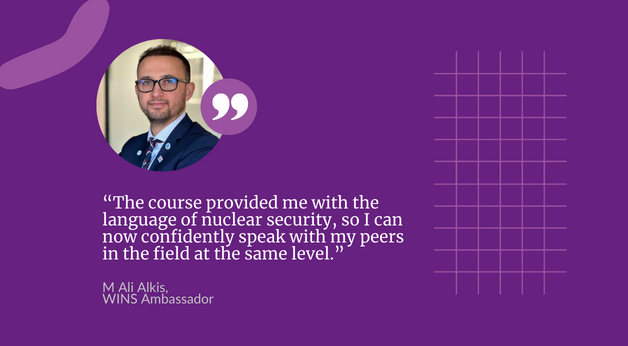M Ali Alkis is a Nuclear Scholar in the UK’s Nuclear Security Culture Programme, a PhD student at the Department of International Relations at Hacettepe University, a Research Affiliate and Gender Champion at the Odesa Center for Nonproliferation, and a WINS Certified Nuclear Security Professional. He shared how his WINS Academy courses deepened his understanding of nuclear security and his advice for potential learners.
What has been your experience with WINS?
While I was completing my master’s degree in nuclear terrorism and nuclear security back in 2015-2017, I was following WINS’ activities and webinars, and I got used to the process of how they provide information about nuclear security. There is even a section about WINS in my MA thesis, in which I highlighted how WINS contributes to the global nuclear security framework as an NGO. I could not have thought that I would represent it today.
And now, during my PhD education, I was invited to be a nuclear scholar at the UK’s Nuclear Security Culture Programme. As a part of it, I was sponsored to enrol in a WINS Academy course. As part of my PhD, I am studying nuclear security in an analytical sense, so I took the Nuclear Security Management elective at the WINS Academy. That module really helped to boost my knowledge, as there are no active nuclear power plants in Türkiye currently, so I cannot go to someone to ask about how nuclear security is implemented. After getting my certification, I became a WINS Academy Academy Ambassador thanks to support of the head of my department, Prof. Yonca İldeş and my supervisor, Assoc. Prof. Sebnem Udum.
How has achieving certification benefited your career development?
In Türkiye, there are not many professionals with ties to nuclear security. Because of that, my master’s thesis was the first on nuclear security in Türkiye, and my PhD will be the first as well. Before taking the course, I already had a theoretical background, and the WINS Academy gave me a fuller picture of the field and provided me with tools to understand the implementation of nuclear security arrangements in real life. Taking the course also helped me to further understand nuclear security and how each stakeholder perceives nuclear security, which will directly help me in writing my PhD dissertation.
“The WINS Academy gave me a fuller picture of the field and provided me with tools to understand the implementation of nuclear security arrangements in real life.”
What advice do you have for current WINS Academy learners or those considering enrolling?
I would say to anyone considering enrolling to do so immediately, as getting certified with the WINS Academy is worth it. It is important to be selective and choose the right elective module by evaluating their aims and what they hope to get out of it.
While studying, I would encourage learners to reread the chapter after taking a quiz to reinforce the knowledge. Because there is so much useful information, you might miss something the first time reading it through. Check the test results and go back if you want to correct the mistakes you’ve made.
What has been your most rewarding experience as a WINS Academy Alumni?
Getting certified with the WINS Academy has given me the opportunity to speak proudly as a nuclear security professional. The course provided me with the language of nuclear security, so I can now confidently speak with my peers in the field at the same level. The WINS Academy gave me this confidence – if I don’t talk about these issues, no one in Türkiye will.
Türkiye is in a unique position as a newcomer to nuclear energy. The country has a long history of established security culture – our institutions, organisations and regulatory body know how to cooperate; however we are now working to integrate nuclear security into the already established security culture. In this way, being a WINS Alumni and Ambassador makes my role unique as someone who is promoting nuclear security culture in Türkiye – and I’m glad to have this opportunity.
“The course provided me with the language of nuclear security, so I can now confidently speak with my peers in the field at the same level.”
As a Gender Champion in Nuclear Policy, can you explain why gender diversity is important to support nuclear security?
Nuclear security is not only male-dominated, but also perceived as a male-dominated field due to the heavy affiliation of professionals who previously worked in male-dominated occupations such as the military, law enforcement, intelligence, and security services. Nuclear security has focused on the protection of nuclear materials, other radioactive materials, and related facilities in order to address mainly non-state actors until recently within the international nuclear security regime. However, the changing nature of the threats, especially after the Russian invasion of Ukraine, has challenged the traditional approach to nuclear security as it seems unlikely to be effective against the full spectrum of today’s risks and threats, including the ones posed by State actors.
As the threats posed by adversaries are changing, this requires professionals to adapt to changing conditions. This brings a broader understanding that nuclear security measures shift from the traditional “guns, guards, and gates” approach to a more comprehensive one, acknowledging the significance of integrated risk management. The new approach recognises security as a general organisational accountability and governance issue. In this framework, nuclear security, more than ever, needs capable nuclear security professionals who fully understand the need to protect and secure nuclear and other radioactive material while preventing its theft and misuse. Nuclear security measures, including protection of material and facilities from sabotage, are only possible with individual competence. In this regard, a workforce covering diverse experience, expertise, and perspectives is one of the ways to ensure it.
